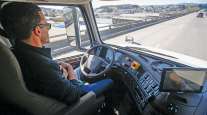Construction Begins on $42 Million Autonomous Vehicle Test Facility in Central Florida

When you think of autonomous cars, the city of Auburndale, Fla., doesn’t come to mind. All of that is expected to change in the coming years.
Officials from Florida’s Turnpike Enterprise, along with state and local officials, on Nov. 13 dedicated SunTrax, a $42 million, 475-acre autonomous vehicle testing site.
Agriculture Commissioner Adam Putnam said the county will be the “testbed for the next generation of technology.”
“Imagine a world where the question is not to allow driverless vehicles on the road, but at what point to ban drivers,” said Putnam, a Republican candidate for governor.
RELATED: $90 million driverless vehicle test track takes shape in Florida
Construction on a 2.25-mile oval track to test cars is expected to be completed by spring 2019. A year later, the infield at SunTrax — with much of the technology used for autonomous testing — will be done, said Paul Satchfield, program management administrator for SunTrax.
In an agreement with the state, Florida Polytechnic University students will play a key role in the testing-ground infield for connected and autonomous vehicles: The university will take the lead in sensor testing and wireless communication of vehicles.
“That’s our area of expertise — computer science and analytics,” Florida Poly President Randy Avent said after the groundbreaking.

SunTrax is also designed to test toll technology, equipment, software, smart-phone-based payments, lane markage, signage and moveable barrier systems.
Satchfield said he doesn’t think the industry is far from having an autonomous vehicle for the highway. The difficulty will be designing the vehicle for urban areas with pedestrians, numerous lights and stop signs.
The facility has replicated a busy Denver intersection for testing.
That’s where Poly students will focus.
“I think it will be about 10 to 20 years before we get to cars driving themselves and talking to each other,” Satchfield said. “But everything they (Poly) teach can be related to this field.”
But he expects increased development around SunTrax way before then.
He said the state will have dozens of new employees at SunTrax, but the majority of jobs will come from businesses involved in the vehicle testing in the $87 billion industry.

In the coming years, he expects businesses will build offices near the facility, and hotels and gas stations will be built.
“Our ultimate goal will be for companies just to build and stay here,” Satchfield said.
In addition to Putnam and Avent, state Sen. Kelli Stargel, (R-Lakeland); Diane Scacceti, executive director of the Florida Department of Transportation; Melony Bell, Polk County Commission chair; Randy Lopez, a student at Florida Poly instrumental in the study of autonomous vehicles; and Beth Kigel, a member of the Florida Transportation Commission, all spoke to about 150 people at the event.
During a five-minute talk, Putnam said Polk County will be at the center of something special.
“The cutting-edge research for what will be one of the most transformational inventions in country’s history the groundwork for that will be laid right here at Florida Poly in Polk County in the state of Florida,” Putnam said.

Scacceti, who introduced the speakers, thanked Ralph Allen for selling the land to the state. Allen, of the Lakeland investment firm Allen & Company, said he met with university and transportation officials in 2015 about the project.
The land had been in Allen’s family since 1952. The Florida Department of Transportation paid about $5 million for the property, Satchfield said.
Distributed by Tribune Content Agency, LLC





